Lent
Friday in Passion Week
There is another feast of the Seven Sorrows of Our Lady on September the 15th. The feast fixed on this Friday in Passion week shows us the divine Mother at the foot of the Cross where Christ is dying (Introit, Sequence, Gospel). “An ineffable union is established between the oblation of the Incarnate Word and that of Mary; the divine blood and the tears of the Mother flow together and are mixed for the redemption of the human race.”
As Judith had delivered Israel by killing Holofernes (Epistle), the Blessed Virgin is our deliverer with Jesus.
Fourth Sunday in Lent or Laetare Sunday
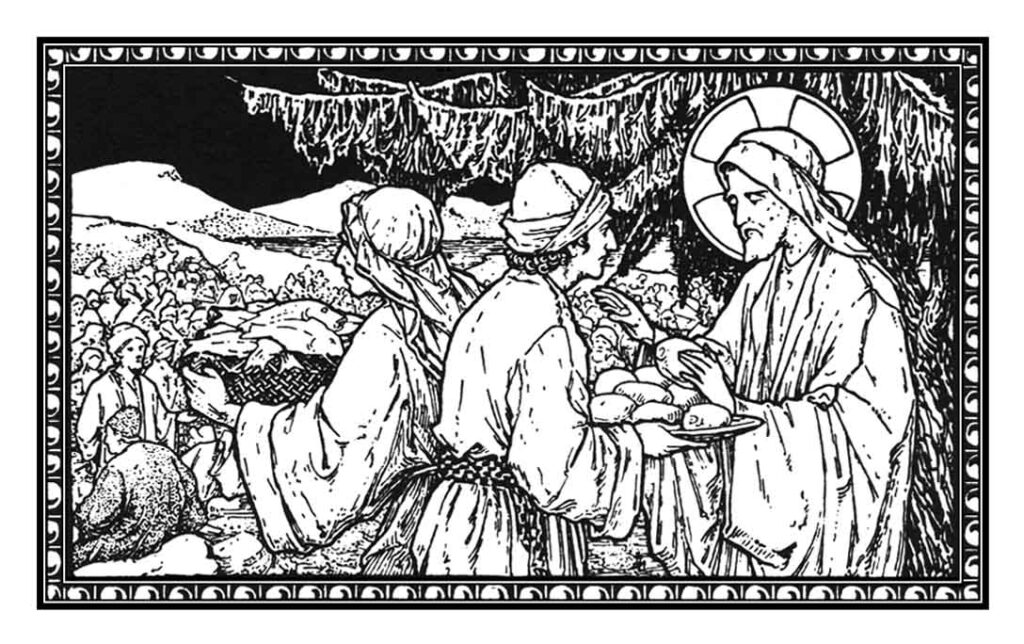
Mid-Lent or Laetare Sunday is a halting place in the midst of Lenten observance. Therefore, dalmatic and tunicle are worn, the altar is decorated with flowers, the organ is being played at Mass and Vespers even for voluntaries. There are flowers on the altar shelves. Rose vestments (derived from the blessing of the golden rose, which the Pope performs sometimes on that day), instead of violet, may be used.
The liturgy today tells us to rejoice. The texts of the liturgy also tell us to rejoice. Introit, Epistle, Tract, and Communion allude to Jerusalem, on the occasion of the Stational Church—the Church of the Holy Cross in Jerusalem. More specifically, the introit tells us, “Rejoice, o Jerusalem, and come together all you that love her. Rejoice with joy, you who have been in sorrow.” The gradual also tells us, ”I rejoiced, because they said to me, ‘We will go up to the house of the Lord.’” Joy is the theme of the liturgy today. So in order for us to understand this theme, we must understand what joy is. Summarizing St. Thomas’ definition, we can say that joy is that movement of the soul which arises from possessing what is good.
The Gospel tells us of the miracle of the multiplication of loaves and fishes, symbols of the Eucharist which we shall receive in our Easter Communion, and the Epistle tells of our deliverance through the sacraments of Baptism and Confession.
The two sons of Abraham (Epistle) symbolize the two Testaments: Ismael, son of Agar, represents the Jews as slaves to the Mosaic law, whilst Isaac, son of Sara, represents the Gentiles whose faith makes them heirs of the promise.
Third Sunday in Lent
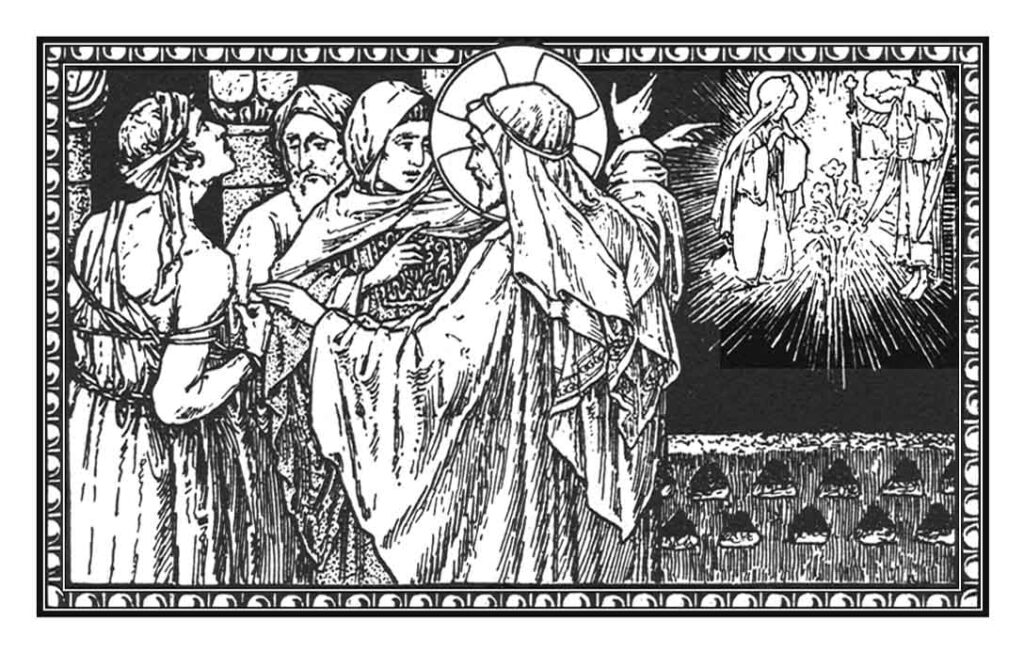
Today we see our Lord in open conflict with Satan, whom He overthrows, disarms, and drives out of a demoniac. This is our Lord’s own explanation which he gave in the form of a parable (Gospel). Satan thought himself secure in his kingdom like the strong man armed guarding the approach to his castle, but the Son of God, stronger than the fallen angel, had come to snatch his unjust conquest from him, and so has acquired us for Himself.
During Lent, which is a time when the struggle against the old man is more intense, we should “live as children of the light, performing actions good, just, and true” (Epistle).
St. Paul is warning us today against sins of the flesh in thought, in word, and in deed. He is warning us not to make anything else our god but God alone. He explains, and he threatens, and in the end he encourages us to give thanks. That’s interesting. Why give thanks as a protection against these sins? Because gratitude requires humility, and humility opens us up to the love of God. Little Thérèse says, “It is the spirit of gratitude which draws down upon us the overflow of God’s grace, for no sooner have we thanked Him for one blessing than he hastens to send us ten additional favors in return.”
Second Sunday in Lent
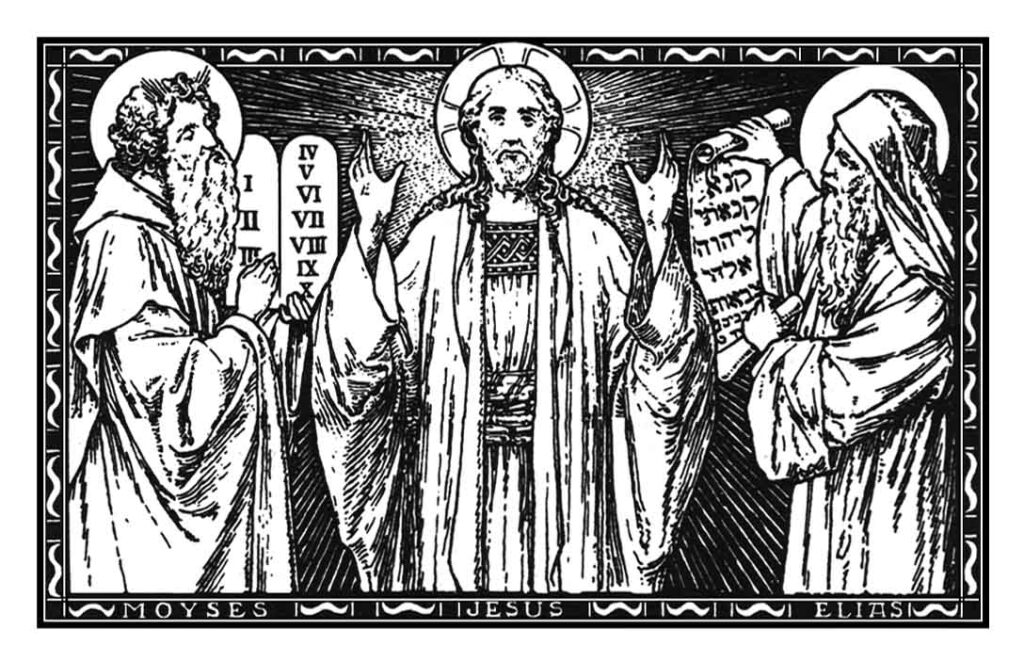
The ordinations of the Saturday in Ember Week began in olden days in the evening, and the present Saturday finished on the Sunday morning. When later a new Mass was composed for the Sunday, the same Gospel was kept.
The Gospel relates the meeting on Mount Thabor of the three who gave us the example of a forty days fast: Moses, Elias, and Jesus.
First Sunday in Lent
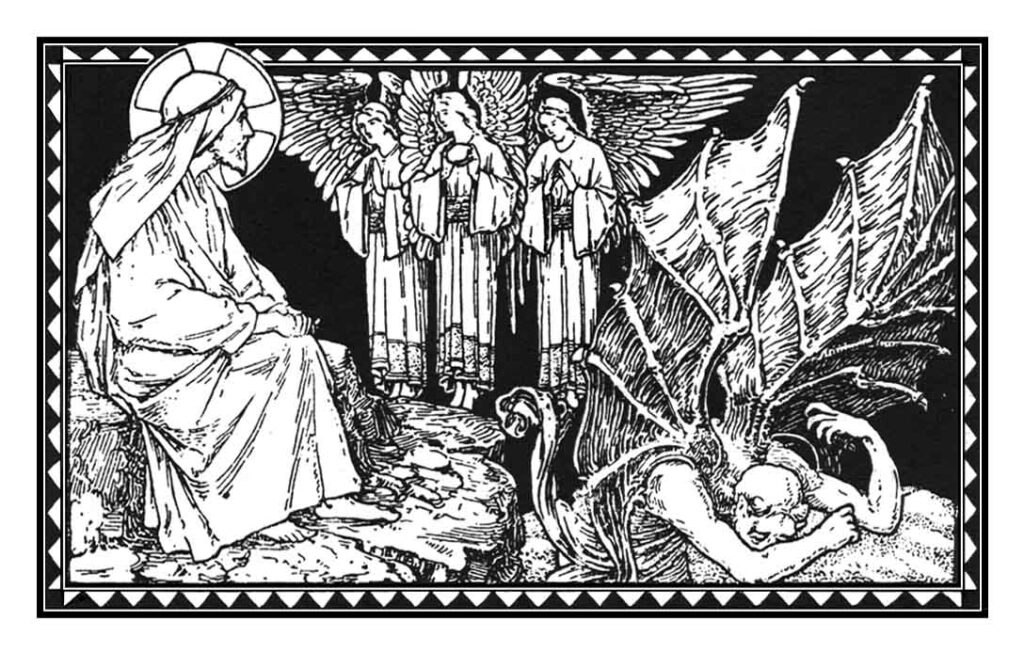
Originally the forty days of penance were counted from the eve of this Sunday to the hour of the Last Supper on Maundy Thursday; then began the celebration of the Paschal mystery, to which the forty days were a preparation.
Our Lord also, after His baptism, began to prepare for His public life by a fast of forty days. He was tempted by Satan, who wished to discover whether the son of Mary was in reality the Son of God (Gospel).
He addresses his first attack to the sense of hunger. In the same way he tries, during the forty days, to make us give up our fasting and mortification. This is the concupiscence of the flesh.
Secondly, the tempter tries to induce Jesus to let Himself be carried by the angels through the air. Satan tempts us by pride, which is opposed to the spirit of prayer and meditation on God’s word. This is the pride of life.
Finally, Satan assures Jesus that he will make Him ruler over all created things. In the same way the devil seeks to attach us to temporal goods, when we ought by almsgiving and works of charity to be helping our neighbors. This is the concupiscence of the eyes or avarice.
As we see, in the Gospel today, our Lord is tempted by the devil. Our Lord, having fasted for forty days and forty nights in the desert, was hungry and alone. And in this moment of human frailty, the devil came along to tempt Him, coaxing Him to show off His Divine power. The Church by selecting this Gospel passage for the first Sunday of Lent shows once again her motherly concern for our spiritual welfare. During the last four days, since Lent began, we all have been tempted probably more than once to give up our good Lenten resolutions and fall back into sin or back into our usual spiritual mediocrity. Let us all, with the help of God, persevere and stay the course.
Ash Wednesday
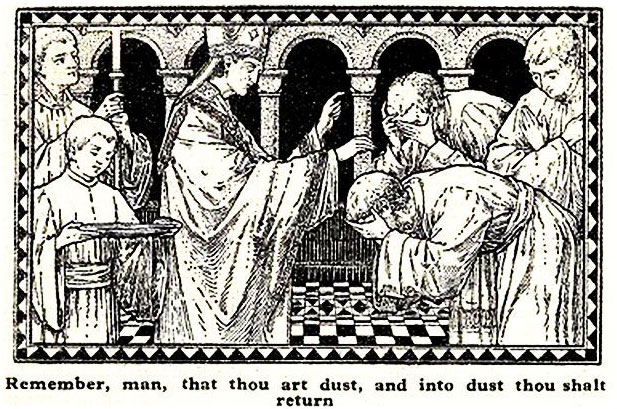
Following the example of the Ninivites, who did penance in sackcloth and ashes, the Church, for the humiliation of our pride and to remind of the sentence of death which we should suffer as the result of sin, today puts ashes on heads saying: “Remember, man, that thou art dust, and into dust thou shalt return.”
It is the remains of an old ceremony. Christians who had committed grave faults were obliged to do public penance. On Ash Wednesday the Bishop blessed the hairshirts which they were to wear during the Forty Days, and sprinkled over them ashes made from the palms of the previous year. Then, whilst the faithful chanted the Seven Penitential Psalms, “the penitents were turned out of the holy place because of their sins, as Adam, the first man was turned out of paradise on account of his disobedience”. They did not enter the church again until Maundy Thursday having won reconciliation by the toil of a forty day’ penance and sacramental absolution. Later on, all Christians, either public or secret penitents, came out of devotion to receive ashes.
The liturgy of today insists on a special way on fasting, the first of the three principal acts of penance.
Please join Catholics around the world today in praying and fasting for peace in Ukraine.